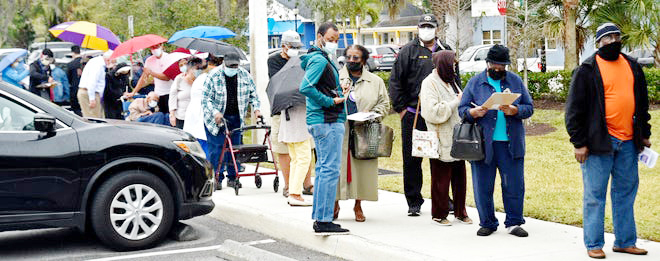By Sandra Long Weaver
Tribune Editorial Director
This week marks the one-year anniversary of the COVID-19 pandemic lockdown. But unlike other anniversary events, this is one I will not be celebrating.
Instead, I will reflect on how the pandemic has changed my life and the thousands of other persons in the middle Tennessee community. The

Tribune Editorial Director
revelations about how it has disproportionately affected the Black community has been disturbing and eye-opening.
Nashville had just begun to assess the damage from the March 3 tornado when the pandemic suddenly changed all our lives. Businesses, restaurants, schools shut their doors. Millions were suddenly unemployed. Over 2.3 million women have left the job market since then.
And here we are one year later with more than 525,000 dead from the disease in the U.S. and more than 11,000 dead in Tennessee.
And Black women have been hardest hit. According to a recent article in the Wall Street Journal, unemployment rate for Black women is more than 8 percent compared with 5.2 percent for white women. The typical Black family has less than $2,000 in liquid savings while white families may have four times that amount.
Median weekly earnings for Black women in 2019 was $704, while white women earned $910. And many Black women were employed in hospitality or retail jobs, the hardest hit by the pandemic. Many of those jobs have gone and will not come back. Their COVID-19 relief checks must go toward purchasing necessities and paying bills.
Day to day, life changed for most of us. Wash your hands and wear a mask became the daily mantra. Social distancing was a new term added to our vocabulary. Conversations about essential workers, medical personnel as first responders and the need for more PPE took place everywhere.
Lockdown became a way of life for many, especially older adults who were most likely to die should they contract the disease. Toilet paper, paper towels, meats and rice disappeared from the grocery shelves. There were long lines for testing, food banks, and to enter grocery stores.
But there is hope. We have an effective vaccine, and most people understand the importance of wearing masks, staying socially distant and frequently washing their hands.
And now that I am vaccinated, I want my hugs. I want a hug and a kiss from each of my three grandchildren I haven’t been able to physically see since March 2020. We’ve stayed in touch through video chats, but it’s not the same as seeing them in person.
I’ve celebrated a dozen birthdays with family and friends on Zoom. Sadly, I’ve also attended four funerals and memorial services of close friends over Zoom.
I’ve learned more about self-care. I take a virtual exercise class at least four times a week. It relieves stress and gets me going each day. And I am back in the hair salon but not yet the nail salon. I know it’s safe but I’m just not ready. Give me a couple more months.
I’ve organized fundraisers for a nonprofit health center over Zoom. Many of my friends and associates have contributed and I want to thank them for their generosity.
So, my self-reflection is not just about how much my life has changed during this unusual and challenging year, but also all the great times and celebrations with family and friends, I have to look forward to when the pandemic is no longer raging throughout our communities.



